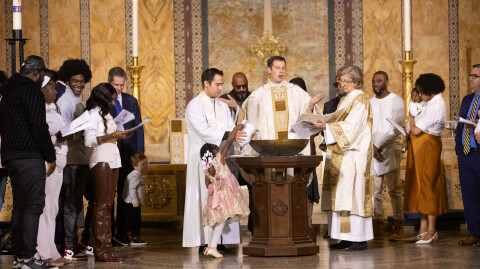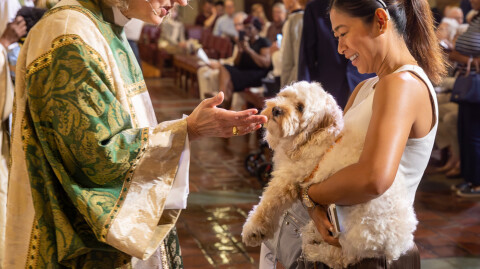I couldn’t stop looking at my phone. My colleague Dr. Paolo Bordignon’s remarkable harpsichord recital deserved my full attention. Paolo—who, in addition to serving as our Organist and Choirmaster, also serves as the harpsichordist of the New York Philharmonic—is the best of the best, and on Tuesday evening, it showed, as he masterfully tackled intricate runs and long cadenzas.
Yet, at the same time that more than a hundred of us were gathered in our beautiful chapel, the campus on which I had spent three years of my life was in chaos. Two weeks before, tents had been erected on the college lawn while the president of the university spoke to Congress. The police were sent in the next day, but the tents did not disappear. The protest only grew, and by Tuesday morning the academic hall in which I had taken many of my undergraduate classes had been occupied. As Paolo sat down to play, the NYPD was once again descending upon my alma mater in staggering fashion.
During Paolo’s recital, my mind jumped between several conflicting realities. The music-making on Park Avenue was elegant and dignified, coordinated and controlled. Paolo and six assisting instrumentalists flawlessly brought Bach’s fifth Brandenburg Concerto to life, working with one another in perfect synchronicity. Up at 116th and Amsterdam, everything seemed divided and out-of-sorts. Students, turning furniture into armor, had barricaded themselves within a building; police were preparing to use a truck to enter through a second-story window. Many miles away, in the region that sparked all this controversy, bombs went off, missiles were fired, and dozens of people died.
Some folks I know have very clear thoughts about the current war in the Middle East and the conflicts it is causing—or exacerbating—in our own context. I do not begrudge them their clarity. But I personally have struggled to reach too many definitive conclusions. I hear the pain, the anger, the fear, and the worry being expressed by figures from a variety of perspectives—and, honestly, it all overwhelms me. I really don’t know how to fairly evaluate the full range of emotions that are being articulated. I’m aware that it’s inadequate, but most of the time I simply resign myself to praying: for all who are hurting and for the healing of the whole world.
This Sunday, we will find ourselves at the end of our Sacred Music Campaign that has already raised tens of thousands in support of the stunningly gorgeous music-making that occurs, week in and week out, in this place. At 11 am, as part of our Choral Feast series, St. Bartholomew’s Choir will sing Mendelssohn’s Die Deutsche Liturgie, a Protestant adaptation of the Roman Catholic mass set to music by a German composer of Jewish heritage. In the assigned reading from the Acts of the Apostles, the Holy Spirit will descend upon a surprising group of outsiders: the Gentiles. In the assigned reading from John’s Gospel, Jesus will tell us to love one another.
Amidst the conflicts we’ve seen this week, both within the borough of Manhattan and far, far away, our worship, music, and talk of love may seem awfully naïve and frivolous. Yet what we do here at St. Bart’s—on Sunday mornings and all throughout the week—serves as an important witness to a more peaceful, more caring, and more considerate way of living. What if, I found myself thinking on Tuesday evening, we all worked together as seamlessly as Paolo worked with his fellow musicians? What if the harmonies we created were as pleasing and coherent? I knew that I was being pollyannaish, but I knew too that, for my sake as well as others’, I had to imagine our world being different, somehow.



